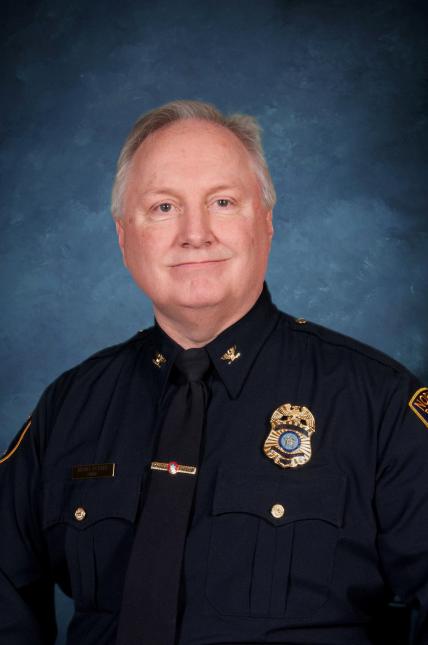The Norman Police Department strives to passionately serve our community through education, innovation, enforcement, and excellence in everything we do. Currently authorized to maintain 184 commissioned officers and 76 civilian employees, NPD has been serving the residents of Norman since 1919. Located just 20 miles south of Oklahoma City on Interstate 35, Norman is the third largest city in Oklahoma with a population of over 128,000 people and is home to the University of Oklahoma. NPD is responsible for protecting and responding to calls that span the city's 197 square miles which include a mixture of dense urban and growing rural areas.
NPD has a main headquarter building in central Norman, as well as an Investigations Center and Training Center. NPD focuses on initiatives to maintain a safe community and create positive partnerships that allow residents to work with us to problem solve and prevent crime. Each member of the police department is continuously challenged to maintain high levels of professionalism and integrity towards all we serve.
In addition to our uniformed officers who serve within patrol, NPD also includes an investigations, community outreach, traffic enforcement, parking services, animal welfare, and numerous specialized teams and units. The department also operates the City of Norman's Communications Center.
The Norman Police Department is a Oklahoma Association of Chiefs of Police accredited law enforcement agency.
Department Information
Mission, Vision, and Values
Mission: Passionately serving our community through education, innovation, enforcement, and excellence in everything we do.
Vision: To be a driving force in public safety by setting the standard for our community, state, and nation.
Values: In pursuit of our mission, Norman Police Department employees value:
Courage - We will stand in the gap between our community and those who would cause harm.
Compassion - We will honor the dignity of all people and remain focused on selfless service to those in need.
Collaboration - We will work in partnership with stakeholders, other agencies, and within our department to strengthen our city.
Commitment - We will remain dedicated to our duty to provide professional policing in an ethical manner that brings pride and honor to our department and our community.
Chief of Police

Kevin Foster became the Chief of Police for the Norman Police Department on November 1, 2019. He is responsible for 180 sworn and 76 non-sworn personnel. For more than 30 years, Chief Foster has served in numerous areas of the police department, including the Support Bureau, Patrol, Criminal Investigations, and Professional Standards. Chief Foster has more than 20 years of executive command and supervisory experience. He is committed to passionately serving the community through education, innovation, enforcement, and excellence.
Chief Foster holds a Bachelor’s degree in Law Enforcement from Northwestern Oklahoma State University and a Master’s Degree from the University of Central Oklahoma in Criminal Justice Management and Administration. He is also a graduate of the International Association of Chiefs of Police Leadership In Police Organizations Course, Police Executive Research Forum Senior Management Institute #69, and the FBI National Academy #252. Chief Foster is a board member for Meals on Wheels of Norman. He is also a member of Norman Rotary, the Police Executive Research Forum, the Oklahoma Association of Chiefs of Police, and International Association of Chiefs of Police.
Chief Foster lives in Norman with his wife of 36 years, Kelly, and their son, Chance, who attends the University of Oklahoma. He and his family attend Bethel Baptist Church of Norman. Chief Foster enjoys spending time with his family, attending OU sporting events, and playing golf.
Department History
The Norman Police Department was formed in 1919 when the City of Norman was chartered. Prior to this the law enforcement duties for the community had fallen upon Deputy U.S. Marshals, then a city marshal. The new police department shared office space with the fire department in a small building in the 100 Block of North Peters Avenue.
In 1924, the department consisted of four officers. By 1936, the staff had increased to eight officers. These officers worked twelve hour shifts, seven days a week, for $110.00 per month. In 1938, four more officers were hired, with the shifts going to eight hour shifts, six days a week. By the mid 1930s, the department had one car which was operated twenty-four hours a day. There were also three officers who walked a foot beat in the downtown area on a twenty-four hour a day basis.
In the summer of 1942, the United States Navy established a Naval Flight Training Center (which soon became Naval Air Station Norman) and a Naval Air Technical Training Center at two locations in Norman. During the war years and until the bases deactivation, the Norman Police worked closely with the Naval Shore Patrol.
Since the war years, the Norman Police Department has continued to grow and improve operations. The Police Department has moved twice, ending up at our current location in 1982.
In 1993, the Norman Police Department began the process of adopting Community Oriented Policing as the approach to solving problems in our community. The City was divided into thirteen police beats with officers being assigned to the beats on a more permanent basis. The Community Oriented Policing philosophy centers around building partnerships between the police department and the citizens and merchants in the community. Working together solutions to problems are discovered and resolutions are attained through cooperation.
In 2019, the Norman Police Department celebrated its Centennial. Today, the department boasts 180 commissioned officers and 71 civilians. With three bureaus, the department continues to evolve to meet the changing needs and innovation of the growing community.
Citizens Advisory Board
To further its focus of transparency and community partnerships, the Norman Police Department maintains the Norman Citizens Advisory Board (NCAB). Representative of the Norman community, the diverse board serves in an advisory capacity to the Chief of Police regarding issues relevant to police-community relations and outreach to the community.
The overall focus of NCAB is to review various department investigations and enhance community trust, as citizen participation and interaction with the police are fundamental to achieving comprehensive law enforcement.
The NCAB’s composition is representative of residents from all members of the city. Members of NCAB will be comprised of a cross-section of residents and inclusive of differences in race, color, national origin, gender, gender identity, sexual orientation, religion, and disability. All residents have the opportunity to apply to become board members. All ethnic and cultural organizations are encouraged to submit candidates for open positions on the NCAB. Applications will open annually.
Current members of the Norman Citizens Advisory Board (NCAB)
Mark Emerson - Chair
Michael Snowdon - Vice Chair
Sarah Roberts - Secretary
Jason Rapp
Sheila McPherson
Gregory Gilkey
Larry Steine
Jason Seapy
Benchmark Cities
The Norman Police Department is an active participant in the Benchmark City Survey. Originally designed in 1997 by a core group of police chiefs from around the country, the survey provides a measurement tool to help departments ensure they are providing the best service possible within their respective community.
The survey, updated annually, provides a wide range of information about each department. With that information, the participating agencies can set better goals and objectives, and compare their performance in the various areas.
2022 Benchmark City Results
Benchmark City Survey: General Dashboard
Benchmark City Survey: Response to Resistance
Benchmark City Survey: Traffic
Benchmark City Survey: Patrol & Dispatch Salary Ranges
Benchmark City Survey: Department Yes & No Questions
Benchmark City Survey: Demographics
NPD Policy Manual
The Norman Police Department aims to uphold a high level of transparency and accountability within the Norman community. A PDF version of the Norman Police Department Policy Manual is available below. Leading with vision, guidance and example, the Norman Police Department works to maintain a culture founded on these policies and articulated in this manual.
Norman Police Department Policy Manual (Effective 01-31-2024)
Partnership for Evaluating Police - Collaborative Initiative with the OU Knee Institute

The Norman Police Department and Ruth Knee Institute for Transformative Scholarship in the Anne and Henry Zarrow School of Social Work at the University of Oklahoma announce a collaborative initiative, Partnership for Evaluating Police. This unique data-sharing and decision-making collaboration is among the first of its kind in the United States.
The strategic partnership brings together the police department with social work scholars to provide not only external, unbiased evaluation of police-related community contact data, but also to develop a consultation mechanism to learn more about how to adjust policies and procedures to better serve the needs of the Norman community.
The Ruth Knee Institute and OU School of Social Work will serve in an advisory capacity to NPD as an external evaluation partner to access data relating to policing activities to identify how this data could connect socio-cultural realties of the community, and to provide recommendations on how to address the complex realities of policing today.
The first project will focus on assessing the impacts of NPD’s traffic enforcement on marginalized community members. Subsequent projects will focus on evaluation of the School Resource Officer program and mental health-related contacts.
Focused on furthering the mission and values of the police department, specifically related to human dignity, transparency, responsibility, and community partnerships, this partnership aims to create long-term solutions.
